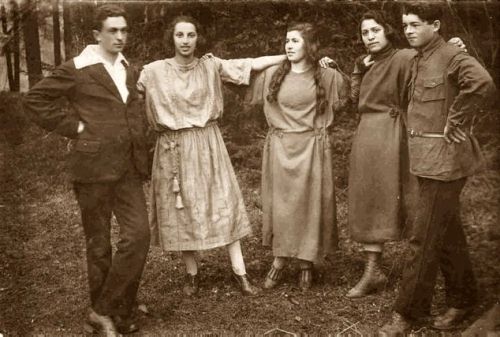
|
We hope to see you soon in our Holy Land. Iyar 5685 – June 12, 1925.”
From right to left: (-), Feige-Reize Zipora Zeif, Chayka Yossman, Leah'ke
Fein and Dov-Berl Levitt (son of Hirshl)
|
Tzila Gudelsky (Shub): I remember a farewell party for chalutzim who made aliya to Eretz Yisrael, which the entire shtetl celebrated on the frozen lake. We sang songs of Eretz Yisrael: “We will be the first one's” and danced the hora, over and over again.
|
|
| “As a memento to our friend Batya Levitt from the Dusiat Histadrut [Federation]
We hope to see you soon in our Holy Land. Iyar 5685 – June 12, 1925.” From right to left: (-), Feige-Reize Zipora Zeif, Chayka Yossman, Leah'ke Fein and Dov-Berl Levitt (son of Hirshl) |
Batya Aviel (Levitt): On the back of the photo is written “the month of Iyar”, Iyar in “defective” spelling, without vowels: Ir, as it was customary in those days.
I recall that they used to say that the chalutzim lacked two months of the year:The first was Iyar that would be read as “Ir”.
“Ir” in Yiddish is the polite form of you. We were lacking in manners and didn't address others in polite language “Ir” [third person], but rather “du“[second person].
The other missing month was Av. Av in Hebrew can also mean father. It was thought that most of the chalutzim were orphans...Yosef Yavnai (Slep): When I was in Ayelet Hashachar, I was a guest in Rosh Pinah, and during the conversation with my hosts I told them that I had received a letter from my parents. The woman was surprised, and in an emotional voice said to her husband:
“Did you hear? The chalutz has parents” …
|
|
| The Tent Camp beside Kumi-Tel Yosef [5] Emek Yizre'el [Valley of Jezreel] September 1928 Liebke Friedman (left) and his friend Avraham Slep |
|
|
| In the Tent Camp beside Ein Harod Liebke Friedman (in the center) |
Batya Aviel (Levitt): The chalutzim subsisted on three P's (in Hebrew):
Pah [tin] – they sat on tin cans
Pitka [chit] – in exchange for which they received food and a train ticket
Protektzia [favoritism]…
| Cost of products
in Egyptian Grush[6]
1 ounce of olives – 1½ E.G.
1 rotl olive oil – 30 E.G.
“Haaretz”, December 9, 1920 |
Footnotes
|
JewishGen, Inc. makes no representations regarding the accuracy of
the translation. The reader may wish to refer to the original material
for verification.
JewishGen is not responsible for inaccuracies or omissions in the original work and cannot rewrite or edit the text to correct inaccuracies and/or omissions.
Our mission is to produce a translation of the original work and we cannot verify the accuracy of statements or alter facts cited.
 Dusetos, Lithuania
Dusetos, Lithuania
 Yizkor Book Project
Yizkor Book Project
 JewishGen Home Page
JewishGen Home Page
Copyright © 1999-2024 by JewishGen, Inc.
Updated 9 May 2009 by LA